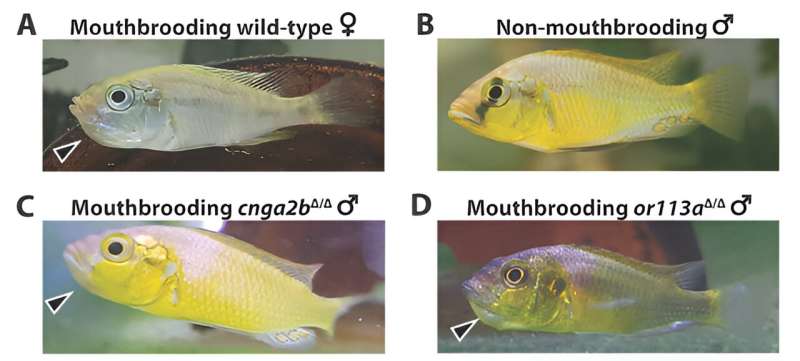This article has been reviewed according to Science X's editorial process and policies. Editors have highlighted the following attributes while ensuring the content's credibility:
fact-checked
peer-reviewed publication
trusted source
proofread
Genetic mutation prompts 'deadbeat dad' fish to start raising their offspring

University of Maryland researcher Cheng-Yu Li was in the lab one day when he noticed a fish with a protruding jaw: A telltale sign that it was incubating eggs in its mouth, keeping its offspring safe until they were big enough to swim solo.
While not an unusual behavior for this particular species, Li was stunned to realize it was a male with a mouthful of eggs. That's because females exclusively perform this parenting role—known as "mouthbrooding"—in Astatotilapia burtoni, a fish in the cichlid family found in African lakes and rivers.
"I didn't know if I was having hallucinations or imagining things," recalled Li, a postdoctoral associate in the Department of Biology and lead author of a new study published on August 1, 2024, in the journal Current Biology. "That was the first mouthbrooding male that I found, so I was very excited."
After setting up cameras to keep closer tabs on the tanks, Li and his colleagues made a surprising discovery: Nearly all of the male A. burtoni fish with a specific genetic mutation picked up eggs in their mouths.
"This was one of those moments in science that is sort of jaw-dropping," said the study's senior author, Scott Juntti, an assistant professor of biology at UMD. "I've been working with these fish for more than a decade and I'd never seen that in my entire life."
Typically, it takes about two weeks for eggs to turn into free-swimming juveniles, and fish are unable to eat while mouthbrooding. Since females are the ones doing the parenting in the wild, this task can take a physical toll on A. burtoni moms.
"They lose weight, they get really skinny—and for an animal of that size not to eat for two weeks, it's a real sacrifice," Juntti said. "Meanwhile, the males are sort of deadbeat dads. They'll jealously guard their territory and attempt to mate with additional females, or at least that's the way it normally works with these animals."
While looking for an explanation for this sudden shift in the males' behavior, Li and Juntti found the pheromone receptor that controls parenting behavior in A. burtoni: or113a. They believe there is a "parental circuit" in the brains of both males and females that drives a mouthbrooding instinct, but when males detect a pheromone emitted by females before laying eggs, it prevents that circuit from being activated.
"A pheromone emitted by fertile females attracts the male to the female initially, but when it comes time to lay the eggs, it seems to cause the male to avoid retrieving the eggs," Juntti explained.
A mutation introduced by CRISPR, a gene-editing technique, essentially switched off the or113a receptor, making the males unable to detect the pheromone. Silencing the ability of neurons to respond to this pheromone prompts male fish to become more hands-on—or "mouths-on," as Juntti put it—fathers.
About 30% of the male fish with this genetic mutation continued to mouthbrood for at least 60 minutes, and some continued to mouthbrood for the entire two weeks. Every female with the same mutation continued to mouthbrood normally for two weeks, hinting that other differences between males and females might be at play.
There are presumably other factors that explain why some of the males held the eggs for a long time while others dropped them quickly, and Li and Juntti are continuing to hunt for answers to those questions.
From an evolutionary perspective, Juntti believes that males' evasive behavior could work to their advantage. If all the males in the wild suddenly started mouthbrooding, they would miss out on mates and potentially lower the number of their offspring that survive.
"If you are already a big, dominant male who's getting opportunities to spawn with females, providing that energy-intensive parental care may not be your best strategy," Juntti said. "It might make more sense to just try and court as many females as possible."
A. burtoni and other cichlids make great research candidates because the family contains about 2,000 species that exhibit a wide range of social behaviors. For example, blackchin tilapia (Sarotherodon melanotheron) males mouthbrood eggs, which is rare for wild cichlids.
UMD Biology Professor Tom Kocher and his colleagues previously sequenced the genome of this species, which carries a mutation in the same pheromone receptor, or113a—another sign that smell and parenting are strongly linked.
"It seems as though an evolving olfactory system can change this social behavior of mouthbrooding," Juntti said.
Ultimately, Li and Juntti believe their findings could lead to future studies that help demystify parenting and its evolutionary diversity.
"Parenting is an ancient behavior, but we don't have a good sense of how parental behavior evolves," Juntti said. "Now that we have a little bit more insight into what regulates parenting behavior, this can provide some new ways to study the neurons and the genes within the brain that are responsible for controlling parenting behavior."
More information: Cheng-Yu Li et al, A pheromone receptor in cichlid fish mediates attraction to females but inhibits male parental care, Current Biology (2024). DOI: 10.1016/j.cub.2024.07.029
Journal information: Current Biology
Provided by University of Maryland



















